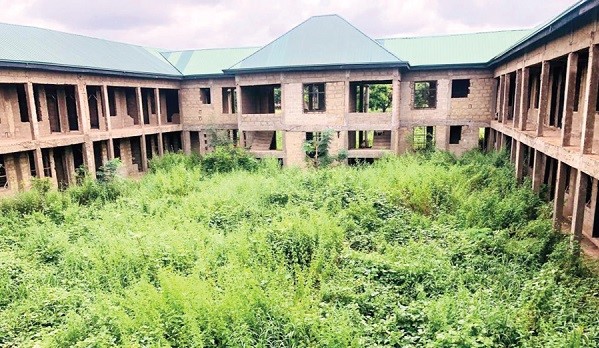Infrastructure at most colleges of education (CoE) across the country are in a dire state as government fails to complete projects started some years ago.
The most recent addition to a tall list of abandoned projects is the 300-bed capacity three-storey hostels project at all 45 CoEs, which the government promised to complete by August 2023.
All the 45 projects were projected to cost GH₵480million and be completed by August 2023. However, at the end of year 2023, except for three that had some work ongoing, all the others had stalled due to the lack of funding.
In 2019, as part of efforts to improve the quality of teacher training in the country, all colleges of education were upgraded to university colleges to begin offering a four-year Bachelor of Education degree.
This policy decision, which changed a three-year programme to four years, demanded extra infrastructure to cater for the teaching and learning requirements as well as accommodation needs – a situation that pushed the government to embark on massive infrastructure projects in all the about 45 CoEs across the country. However, as at the end of 2023, the majority of these projects have stalled.
The immediate implication of this situation is the imposition of a 30 percent admission quota, which has reduced intake by over 6,000 students.
While the government has not been able to raise GH₵480million to complete these projects among other classroom and learning facilities in the 45 institutions in what is described as a misplaced priority, the government has spent over GH₵1billion in teacher trainees’ allowance.
In the face of this menace to the production of teachers for the nation, Africa Education Watch (Eduwatch), Institute for Education Studies (IFEST) and over 50 other civil society stakeholders in education have called on the government to complete all stalled infrastructure projects in CoEs and remove the 30 percent admission cuts before the 2024/25 academic year.
The CSOs, in a statement, said: “The lack of funds to continue stalled infrastructure projects in CoE to accommodate the four-year B.Ed. students have led to the imposition of admission quotas in CoEs, reducing intake by over 6,000 students.
“This is an unfortunate case of non-prioritised spending, especially when the government has over the last seven years invested about GH₵1billion in teacher trainees’ allowance amid a student loan scheme for tertiary students.”
Background
The colleges, previously known as teacher training colleges, were – until 2007 – running various programmes such as two-year post-middle school Certificate ‘B’, four-year post-middle Certificate ‘A’, and three-year post-secondary Certificate ‘A’ programmes.
Following a comprehensive review of the educational system in 2004, the then 38 training colleges were upgraded to diploma-awarding institutions and affiliated with the University of Cape Coast.
Subsequently, eight more private colleges were absorbed into the public system by the government. In 2018, the colleges went through a transition and were upgraded from three-year Diploma in Basic Education awarding institutions to four-year Bachelor of Education degree awarding institutions.
The degree programmes offer three main areas of specialisation — early grade education, primary education, and junior high school education. These included a modular-tailored form of training to prepare teachers to teach in basic schools in the country.
The national dialogue
In July 2022, a national dialogue was organised to discuss the state of colleges of education in Ghana and how the challenges could be addressed. The participants acknowledged that the colleges of education were beset by infrastructural challenges of various kinds. The infrastructural facilities found in the colleges have, on average, been in use for over sixty years.
It was observed that the introduction of the Free Senior High School (FSHS) policy increased considerably the number of candidates who apply for admission into colleges of education. This, coupled with the infrastructure deficit, has forced the CoEs to resort to a double-shift system where different cohorts report for academic work alternatively.










